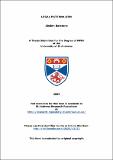Files in this item
Legal paternalism
Item metadata
| dc.contributor.advisor | Archard, David | |
| dc.contributor.author | Batstone, Aislinn | |
| dc.coverage.spatial | viii, 79 p. | en_US |
| dc.date.accessioned | 2018-04-25T15:04:41Z | |
| dc.date.available | 2018-04-25T15:04:41Z | |
| dc.date.issued | 2003 | |
| dc.identifier.uri | https://hdl.handle.net/10023/13222 | |
| dc.description.abstract | Legal paternalism is the interference by the state in the choice or choices of citizens, for the good of those citizens. There are strong intuitions for and against paternalism, which correspond to the value we place on well-being and self-determination, respectively. This thesis takes as a starting point a certain balance between these two values, and explores its ramifications at a number of levels. Paternalism is taken to be justified only when the choices in question are not expressions of self-determination. I first explore what it takes for a choice not to be an expression of self-determination through a discussion of voluntariness and its relationship to compatibilism in discussions of freedom of the will. I conclude that which choices are expressions of self-determination is a matter to be settled in the practical domain. This idea is explored in a discussion of decision-making competence. Finally, I outline the positive normative ethical evaluation of self-determination which provides the justification for the anti-paternalist stance. | en_US |
| dc.language.iso | en | en_US |
| dc.publisher | University of St Andrews | |
| dc.subject.lcc | BJ55.B2 | |
| dc.subject.lcsh | Paternalism--Moral and ethical aspects. | en |
| dc.subject.lcsh | Law and ethics. | en |
| dc.subject.lcsh | Liberty--Philosophy. | en |
| dc.title | Legal paternalism | en_US |
| dc.type | Thesis | en_US |
| dc.contributor.sponsor | Commonwealth Scholarship Commission in the United Kingdom | en_US |
| dc.type.qualificationlevel | Doctoral | en_US |
| dc.type.qualificationname | MPhil Master of Philosophy | en_US |
| dc.publisher.institution | The University of St Andrews | en_US |
This item appears in the following Collection(s)
Items in the St Andrews Research Repository are protected by copyright, with all rights reserved, unless otherwise indicated.

